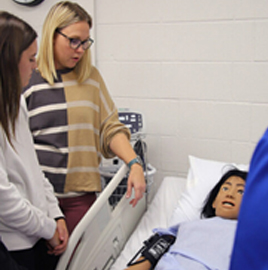Brittany Hubbart
Groton High School, Health Science

What kinds of health science classes do you teach?
I teach intro to sports medicine, medical terminology, gateway to CNA (certified nurse’s assistant), and health care career exploration. I also head up our capstone experiences and internship opportunities. I also teach physical science.
What kinds of things do students learn in your classes?
In sports medicine, it’s emergency care and taping techniques. In healthcare career exploration, I’ve had them put sutures on a banana, they got to practice putting IVs in – they did all sorts of cool things in that class. There are a lot of field trips – we’ve gone to Avera St. Luke’s, a pharmacy, a funeral home, Groton Fire & Rescue, and more. We also have guest speakers come in to talk about respiratory therapy, nursing, vision care – we bring each of those professions to students. It’s fun to see all of those potential things open up for them.
What kind of equipment do you and your students have access to in Groton?
We’ve been very lucky to receive great grants these past few years. Our syn-cadaver looks and feels like a real cadaver. Kids in sports medicine and healthcare careers can better learn anatomy with that. We have mannequins that we can check vital signs with – they talk back to students to give it a more real feel. Our last grant brought in a whole new world of exercise science for students. We have an integrated treadmill that measures all of the force put upon it. It has two different belts so we can see gait mechanics and look how that affects training. We have a concussion rehab clinical set that looks at reaction times and other things related to concussions.
How are CTE classes different from core high school classes?
There is a smaller subgroup, so we’re able to focus on hands-on training. It’s neat that we have the opportunity to teach skills to students. Overall, there’s a much higher level of engagement in CTE classes; there’s excitement to get to real-world experiences. They see a value in it right away.
What’s something that surprised you about teaching CTE?
The community excitement surrounding it surprised me. In Groton, I’ve been very lucky to have the community embrace what I’m doing, and that makes the success rate go up because everyone is engaged.
